Solution 1
(i) Given: (x+5)(x-5)=24

(ii)
Given: ![]()
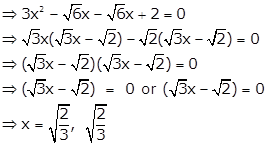
(iii)
Given: ![]()

![]() or
or ![]()
(iv)
To find : x
Given quadratic equation is ![]() …. (i)
…. (i)
One of the roots of (i) is ![]() , so it satisfies (i)
, so it satisfies (i)
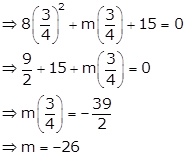
So, the equation (i) becomes ![]()
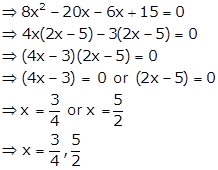
Hence, the other root is![]() .
.
One root of the quadratic equation ![]() is -3, find its other root.
is -3, find its other root.
Given quadratic equation is ![]() …. (i)
…. (i)
One of the roots of (i) is -3, so it satisfies (i)

Hence, the other root is 2a.
If ![]() and
and ![]() ;find the values of x.
;find the values of x.
So, the given quadratic equation becomes
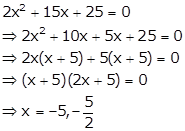
Hence, the values of x are ![]() and
and![]() .
.
Find the solution of the equation![]() ; if
; if ![]() and
and ![]() .
.
Given quadratic equation is ![]() ….. (i)
….. (i)
Also, given ![]() and
and ![]()
![]() and
and ![]()
So, the equation (i) becomes
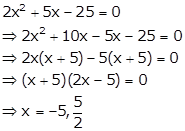
Hence, the solution of given quadratic equation are ![]() and
and![]() .
.
If m and n are roots of the equation ![]() where x ≠ 0 and x ≠ 2; find m × n.
where x ≠ 0 and x ≠ 2; find m × n.
Given quadratic equation is ![]()
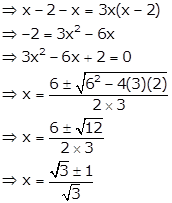
Since, m and n are roots of the equation, we have
![]() and
and ![]()

Hence, ![]() .
.
Solve, using formula :
![]()
Given quadratic equation is ![]()
Using quadratic formula,
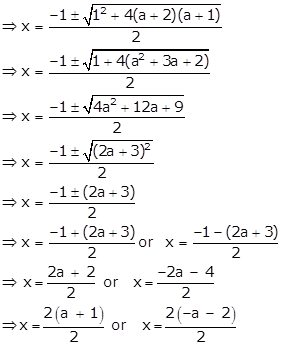
⇒ x = a + 1 or x = -a - 2 = -(a + 2)
Solve the quadratic equation ![]()
(i) When ![]() (integers)
(integers)
(ii) When ![]() (rational numbers)
(rational numbers)
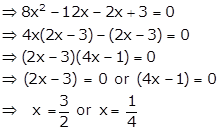
(i) When ![]() the equation
the equation ![]() has no roots
has no roots
(ii) When ![]() the roots of
the roots of ![]() are
are
![]() or
or ![]()
Find the value of m for which the equation ![]() has real and equal roots.
has real and equal roots.
Given quadratic equation is ![]()
The quadratic equation has real and equal roots if its discriminant is zero.
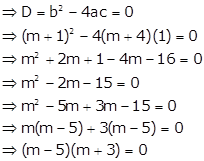
![]() or
or ![]()
Find the values of m for which equation ![]() has equal roots. Also, find the roots of the given equation.
has equal roots. Also, find the roots of the given equation.
Given quadratic equation is ![]() …. (i)
…. (i)
The quadratic equation has equal roots if its discriminant is zero

When ![]() , equation (i) becomes
, equation (i) becomes
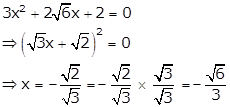
When ![]() , equation (i) becomes
, equation (i) becomes
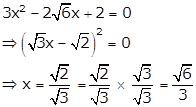
∴ x = ![]()
Find the value of k for which equation ![]() has real roots.
has real roots.
Given quadratic equation is ![]() …. (i)
…. (i)
The quadratic equation has real roots if its discriminant is greater than or equal to zero
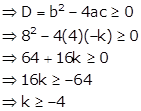
Hence, the given quadratic equation has real roots for![]() .
.
Find, using quadratic formula, the roots of the following quadratic equations, if they exist
(i) ![]()
(ii) ![]()
(i) Given quadratic equation is ![]()
D = b2 - 4ac =![]() = 25 - 24 = 1
= 25 - 24 = 1
Since D > 0, the roots of the given quadratic equation are real and distinct.
Using quadratic formula, we have
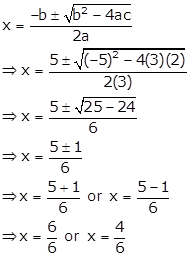
![]() or
or ![]()
(ii) Given quadratic equation is ![]()
D = b2 - 4ac =![]() = 16 - 20 = - 4
= 16 - 20 = - 4
Since D < 0, the roots of the given quadratic equation does not exist.
Solve :
(i) ![]() and x > 0.
and x > 0.
(ii) ![]() and x < 0.
and x < 0.
(i) Given quadratic equation is ![]()
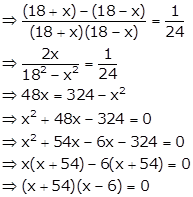
![]() or
or ![]()
But as x > 0, so x can't be negative.
Hence, x = 6.
(ii) Given quadratic equation is ![]()
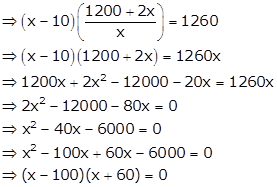
![]() or
or ![]()
But as x < 0, so x can't be positive.
Hence, ![]()
No comments:
Post a Comment